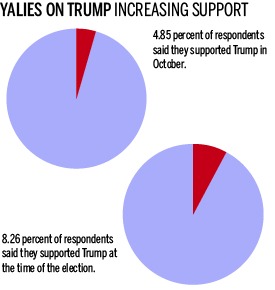
Less than 5 percent of the undergraduates who replied to a News survey distributed in October indicated that they supported now-President Donald Trump. But two months later, more than twice that number recalled voting for Trump on Election Day, suggesting a late surge in campus support for Trump.
Roughly 9 percent of respondents to a News survey distributed in January said they supported Trump on Election Day. 743 students responded to the survey and the results were not adjusted for bias.
This increased figure still makes Yale a distinctly anti-Trump campus by national standards. Thirty-seven percent of Americans between the ages of 18 and 29 voted for Trump nationwide, according to the Center for Information and Research on Civic Learning and Engagement.
The difference between October and January’s figures might be explained by a phenomenon pollsters have tracked since Franklin D. Roosevelt’s presidency, called retroactive vote reporting, in which more people recall voting for the winning candidate than actually do. The gap between declared and actual voters has been attributed to a variety of factors, including lying about their voting record in order to align themselves with the candidate they now perceive as better or more successful and forgetting which candidate they supported.
Still, many Yale students expressed surprise at the increase in support for Trump on campus between the October survey and Election Day.
“I’m surprised because a lot of his controversial statements about different religions and women came out in the period between October and Election Day,” Stephanie Spear ’19 said. “I find it hard to believe that the number of Trump supporters nearly doubled over this span at Yale.”
Nicolas Jimenez ’19 said he was “moderately surprised” that Trump’s favorability rose in spite of his “lewd comments.”
For Annie Rosenthal ’20, the results came as less of a surprise. Rosenthal said she thinks students who backed Trump all along have grown “more comfortable admitting … publicly” that they support him. Even so, she found the surge in support unsettling.
“It is surprising from a moral standpoint,” she said. “I’m shocked and outraged to hear that.”
She added that although it is possible Trump’s policies swayed students who previously did not support him, it seems more likely that students who supported him all along grew more comfortable coming forward. Other students were less surprised by the results. Alex Crich ’19 said he was not that alarmed because “9 percent isn’t a lot.” What surprised him more, he said, was the difference in the number of Trump supporters between the two surveys. In the wake of Trump’s electoral victory, animosity towards his supporters may have softened, Crich said.
“Trump has always had the stigma of being Trump,” he explained. “He still does, but I guess that now that he’s won, there’s a little bit less of a stigma.”
Ben Zollinger ’19 agreed that a decrease in stigma surrounding Trump supporters from October to after Election Day may explain the survey’s results. Zollinger said that, before the election, he felt that many students who did not support Trump more actively tried to combat his campaign. But the “angry, fighting spirit” of these students has now been replaced by “exasperation and frustration,” Zollinger said.
He added, though, that because of a continuing stigma about supporting Trump, it was likely that a higher number of students than the reported number of 8.64 percent actually supported Trump on Election Day.
Spear said some students who were undecided in October might have been pushed to Trump’s side by Yale’s political climate.
“Being such a liberal campus might have alienated people on that middle line,” Spear explained.
On the October survey, 6.03 percent of respondents said they did not support a candidate, and 2.83 percent said they were undecided. If these numbers are representative of the greater undergraduate body, it would mean that roughly 500 students were either undecided or did not endorse a candidate in October.







